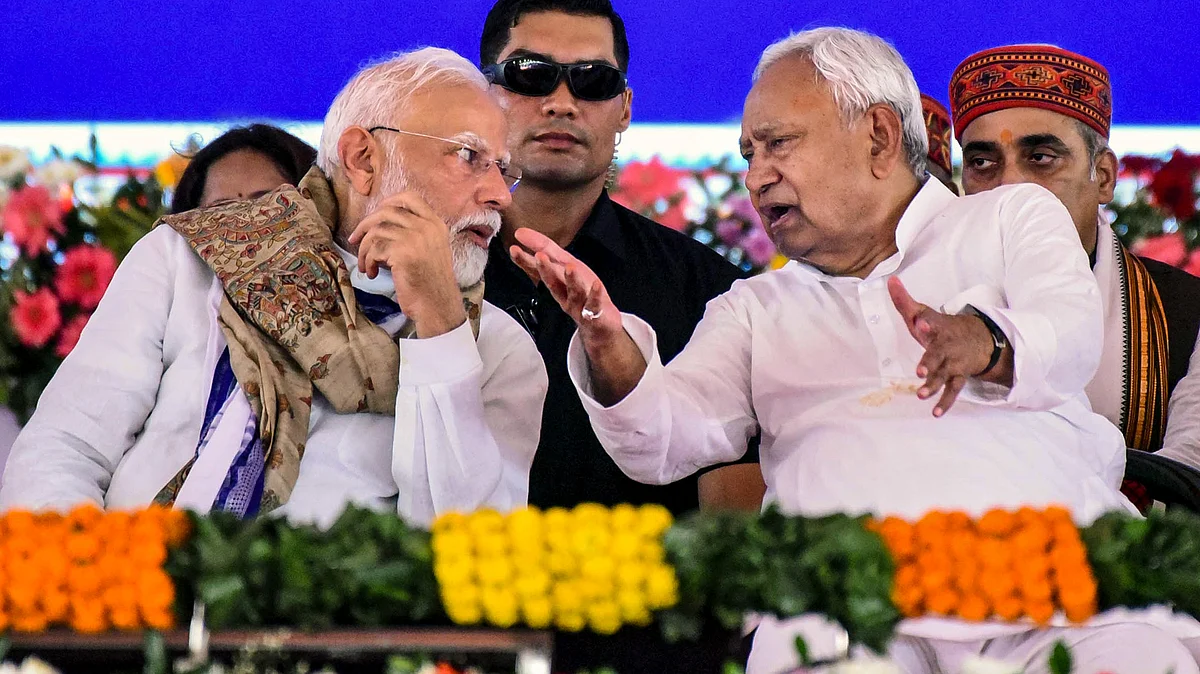Dalits in Bihar impatient for change: National Dalit body chief
NACDAOR chairman warns Modi, Nitish as report highlights poor education, health, jobs and atrocities against Dalits

Dalits in Bihar remain marginalised and are growing increasingly impatient for change, said Ashok Bharti, chairman of the NACDAOR (National Confederation of Dalit and Adivasi Organisations), at the release of a report titled 'What Dalits Want' today on Thursday, 9 October.
Commenting on an incident where a lawyer attempted to throw a shoe at Chief Justice of India B.R. Gavai, Bharti stated that the attack was essentially directed at the State, which he described as 'totally defunct', since the CJI symbolises the State's vital pillar of the judiciary.
Bharti warned Prime Minister Narendra Modi and Bihar chief minister Nitish Kumar that they ought to 'pray' that the incident does not affect their electoral support in the forthcoming Bihar Assembly elections.
The polls are scheduled to be held in two phases on 6 and 11 November, with vote counting set for 14 November. The elections will pit the ruling NDA government, led by CM Nitish Kumar, against an Opposition coalition comprising the RJD, Congress, and others.
According to the report, Scheduled Caste (SC) communities form 19.65 per cent of Bihar's population, yet persistent inequalities have deprived them of their fair share in the state's development progress.
Bharti told a press conference in New Delhi that Dalits are profoundly marginalised in critical areas such as education, healthcare, and employment, and are fundamentally opposed to the existing status quo. He observed that the community appears to be distancing itself from Kumar, though it remains uncertain which direction it will ultimately take.
Responding to the shoe-throwing incident, Bharti said, "Nitish Kumar and Modi ji should pray that this does not impact votes in their favour."
He added, "A shoe was thrown at the chief justice of India, yet not even an FIR was registered. This act was not targeted at B.R. Gavai personally but at the State he represents. The State is completely defunct and incapable of protecting itself."
The NACDAOR report reveals a Dalit literacy rate in Bihar of 55.9 per cent, significantly below the national average of 66.1 per cent for the community. Illiteracy among Dalits stands at nearly 62 per cent, with the situation noticeably worse among Musahars, whose literacy rate is under 20 per cent — the lowest among caste groups nationwide.
Major findings
Quoting the All India Survey on Higher Education by the ministry of education, the report notes that despite comprising 19.65 per cent of the population and receiving a 17 per cent constitutional reservation, Dalits represent only 5.6 per cent of faculty members and students in higher education institutions.
Approximately 63.4 per cent of Dalits are non-workers, predominantly women and youth. Among those employed, 46 per cent are marginal workers engaged in less than six months of work annually, around 21 per cent have full-time employment — mostly as landless labourers or casual wage earners — and only 1.3 per cent of Dalits in Bihar hold government jobs.
Health indicators also lag behind: infant mortality among Dalits is 55 per 1,000 live births compared to the state's average of 47 and the national average of 37. Maternal mortality among Dalit women is recorded at 130 per 1,000 live births, against 118 state-wide and 97 nationally.
Over 84 per cent of Dalit households do not own land, with only 7 per cent having cultivable land. The average per capita income for Dalit households is Rs 6,480, nearly 40 per cent lower than the Bihar average.
Between 2010 and 2022, Bihar reported 85,684 cases of atrocities against Dalits, averaging 17 incidents daily, underscoring ongoing systemic challenges facing the community.
With PTI inputs
Follow us on: Facebook, Twitter, Google News, Instagram
Join our official telegram channel (@nationalherald) and stay updated with the latest headlines
